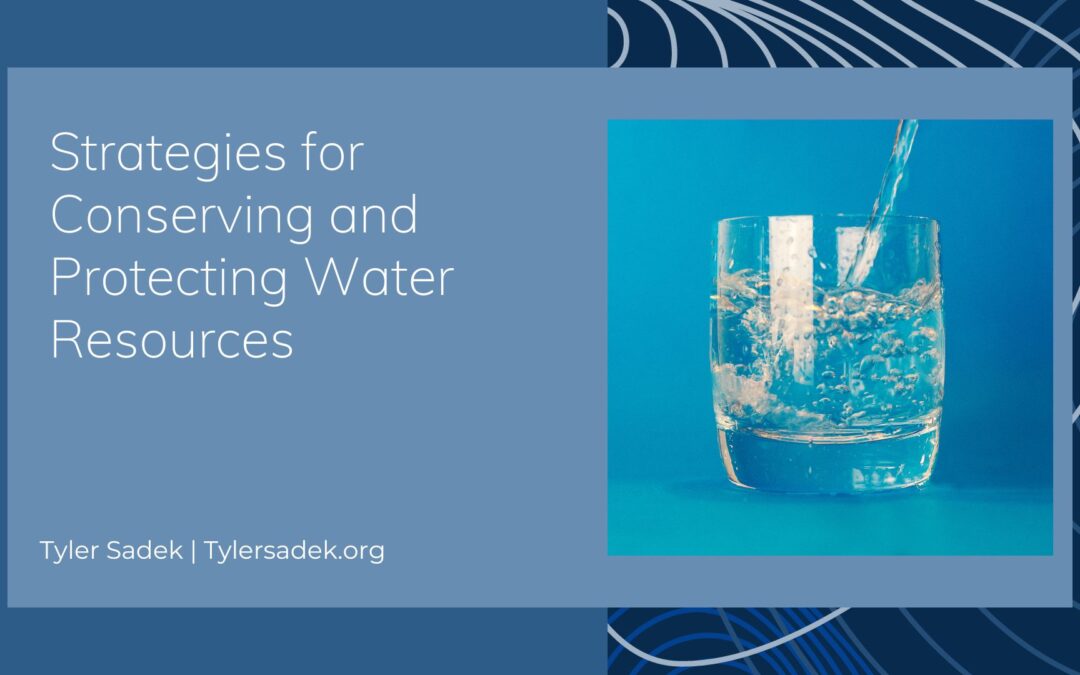Water is a precious and finite resource that sustains life on Earth. It’s essential for drinking, agriculture, industry, and countless other purposes. However, growing populations, climate change, and unsustainable practices are placing increasing pressure on our water resources. To ensure a sustainable future, we must prioritize conserving and protecting these invaluable water sources.
1. Reduce Water Waste
One of the most straightforward and effective ways to conserve water is to reduce waste. This involves both individual and collective efforts to use water more efficiently:
– Fix Leaks: Address household leaks promptly. A dripping faucet or a leaking toilet can waste a significant amount of water over time.
– Upgrade Fixtures: Install water-efficient fixtures like low-flow toilets, showerheads, and faucets. These can reduce water usage without sacrificing functionality.
– Use Appliances Efficiently: To maximize water efficiency, operate washing machines and dishwashers with full loads. Consider upgrading to water-saving models.
– Collect Rainwater: Install rain barrels to collect and store rainwater for use in gardening or landscape irrigation.
2. Practice Water-Efficient Landscaping
Landscaping accounts for a substantial portion of residential water use. By adopting water-efficient landscaping practices, you can significantly reduce water consumption:
– Xeriscaping: Design your landscape using xeriscaping principles, which prioritize drought-tolerant plants and minimal water usage.
– Mulching: Apply mulch to garden beds to retain soil moisture and reduce evaporation.
– Smart Irrigation: Install a smart irrigation system that adjusts watering schedules based on weather conditions and soil moisture levels.
– Group Plants by Water Needs: Group plants with similar water requirements together to avoid overwatering or underwatering.
3. Implement Water Recycling and Reuse
Water recycling and reuse systems are becoming increasingly popular in both residential and industrial settings:
– Graywater Systems: Install graywater systems that collect and treat water from sinks, showers, and washing machines for non-potable uses like toilet flushing and landscape irrigation.
– Industrial Reuse: Many industries are adopting water recycling systems to reduce their reliance on freshwater sources and minimize wastewater discharge.
4. Protect Natural Watersheds
Preserving the health of natural watersheds is vital for the quality and quantity of available water. Watersheds are the areas that drain into a river, lake, or other body of water. Strategies to protect watersheds include:
– Riparian Buffer Zones: Establish and maintain riparian buffer zones of native vegetation along water bodies. These zones help filter pollutants and prevent erosion.
– Reduce Runoff: Implement practices to reduce urban and agricultural runoff, which can carry pollutants into water bodies.
– Wetland Conservation: Protect and restore wetlands, as they play a crucial role in filtering water and providing habitat for wildlife.
5. Use Sustainable Agricultural Practices
Agriculture is a major consumer of water resources. Sustainable farming practices can reduce water usage while maintaining or improving crop yields:
– Drip Irrigation: Adopt drip irrigation systems that deliver water directly to the base of plants, minimizing evaporation and reducing water wastage.
– Crop Rotation: Implement crop rotation to improve soil health and reduce the need for excessive irrigation.
– Precision Agriculture: Use technology like soil moisture sensors and satellite imagery to optimize irrigation schedules and fertilizer application.
– Dry Farming: Explore dry farming techniques that rely solely on natural precipitation in regions with adequate rainfall.
6. Promote Water Education and Awareness
Public awareness and education are critical in promoting water conservation and protection:
– School Programs: Introduce water conservation education in schools to instill good practices from a young age.
– Community Initiatives: Organize community workshops, seminars, and awareness campaigns to inform residents about the importance of water conservation.
– Behavioral Nudges: Use behavioral science techniques to encourage water-saving behaviors, such as using water-saving appliances and fixing leaks promptly.
7. Advocate for Water Policy and Regulation
Advocating for strong water policies and regulations at local, regional, and national levels is essential for effective water resource management:
– Water Efficiency Standards: Support and lobby for the adoption of water efficiency standards for appliances, fixtures, and industrial processes.
– Water Pricing: Implement tiered water pricing structures that encourage conservation by charging higher rates for excessive water use.
– Ecosystem Protection: Advocate for policies prioritizing protecting aquatic ecosystems and wetlands.
8. Invest in Water Infrastructure
Maintaining and upgrading water infrastructure is crucial for minimizing water losses and ensuring the efficient distribution of clean water:
– Leak Detection: Invest in advanced leak detection technology to promptly identify and repair leaks in water distribution systems.
– Wastewater Treatment: Upgrade wastewater treatment facilities to ensure the safe return of treated water to the environment.
9. Support Water Research and Innovation
Continued research and innovation in water conservation technologies and practices can lead to breakthroughs in water resource management:
– Desalination: Explore advancements in desalination technology to convert seawater or brackish water into freshwater.
– Water-Saving Agriculture: Invest in research to develop drought-resistant crop varieties and more efficient irrigation methods.
10. Personal Accountability
Individuals can make a significant impact through conscious daily choices:
- Shorter Showers: Reduce shower time and install low-flow showerheads.
- Turn Off Faucets: Turn off the tap while brushing teeth or washing dishes.
- Full Loads Only: Run washing machines and dishwashers only with full loads.
- Water-Smart Purchases: When replacing appliances, choose water-efficient models.
- Educate Others: Share water-saving tips and practices with friends and family.
Conclusion
Water is a finite and essential resource that demands our collective attention and responsible stewardship. Implementing strategies for conserving and protecting water resources is crucial not only for our immediate needs but also for future generations’ well-being and our planet’s sustainability. By reducing waste, adopting sustainable practices, and advocating for sound water policies, we can ensure that clean and abundant water remains accessible to all. The journey towards water conservation and protection begins with individual actions, but it ultimately depends on our collective commitment to safeguarding this invaluable resource.

